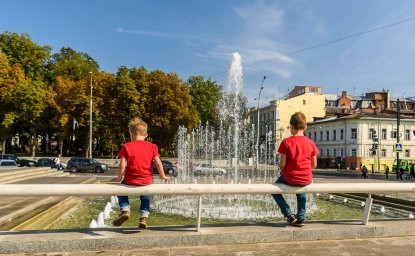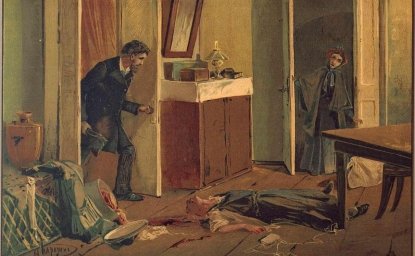The Kennan Institute asked some of our scholars to share part of their 2018-2019 winter reading lists. Here are a few of their picks, ranging from Central Asian history to Soviet festivals.
Farrukh Irnazarov, George F. Kennan Fellow, Kennan Institute
Lost Enlightenment: Central Asia’s Golden Age from the Arab Conquest to Tamerlane by S. Frederick Starr. This book will appeal to both specialists and general readers, as it sheds light on the not so well-known region of Central Asia and its glorious past. Once an intellectual hub, the region produced a number of great scientists, philosophers, musicians, poets and theologists, and their legacy can be found in most modern disciplines. In fact, Avicenna helped shape European medicine, and Al-Khwarizmi is known as the “father of algebra”. The subject is meticulously researched, well-illustrated, and written in a lively and engaging style.
The Silk Roads: A New History of the World by Peter Frankopan. The book addresses a number of questions related to travels and networks by means of which it provides a new approach to history. It aims to shift attention from Europe to countries that used to be part of the Silk Road—Turkey, the Middle East, the Caucasus, Central Asia, India and China—by showing different roads and their development over time. The assessment in the book is closely tied to economic analysis, and it clearly depicts the reasons behind the rise and fall of empires along the Silk Road. The book is highly vivid and entertaining.
Maria Blackwood, Title VIII Research Scholar, Kennan Institute
The Hungry Steppe: Famine, Violence, and the Making of Soviet Kazakhstan by Sarah Cameron. Based on extensive research in previously inaccessible archives as well as oral history interviews and memoir literature, this book chronicles the devastating Kazakh famine of 1930-1933 and its role in the creation of Soviet Kazakhstan. In this thorough and compassionate study, Cameron provides important new insights into Soviet modernization, state violence, and identity formation in the Stalin era.
The Baron's Cloak: A History of the Russian Empire in War and Revolution by Willard Sunderland. Tracing the fascinating life of Baron Roman Fedorovich von Ungern-Sternberg, Sunderland brilliantly illuminates the nature of the Russian Empire as a complex, multiethnic, and truly Eurasian polity. This highly engaging books offers a captivating new perspective on the messy process of imperial collapse—and its reverberations in the emergence of the Soviet Union.
Evgeny Troitskiy, George F. Kennan Fellow, Kennan Institute
The Sleepwalkers: How Europe Went to War in 1914 by Christopher Clark. This book is a brilliant insight into the origins of World War I. Clark masterfully reconstructs the complexities of decision-making in the European capitals and brings together an astonishing variety of variables, ranging from strategic considerations to psychological predispositions and sheer coincidences. His preoccupation is not with assigning blame but with explaining how statesmen across Europe allowed normalcy to turn into a prolonged nightmare. “Watchful but unseeing” is his diagnosis of the characters of his books. It seems that these words are more than relevant to describe the mindsets of their distant successors.
Ontology and World Politics: Void Universalism I by Sergei Prozorov. This is an ambitious book, and its author is looking for an ontological dimension of IR theory. The text is extremely dense, at times opaque, and takes much effort to read. Like many texts bordering on philosophy, it calls for multiple interpretations. One of them might be that the author is striving to discover the (forgotten? neglected?) existential modus of world politics. And the more the author and the readers are looking into the void universalism of world politics, the more the void begins looking at them.
Catherine Schuler, Wilson Fellow, Kennan Institute
Memory Laws, Memory Wars: Politics of the Past in Europe and Russia by Nikolay Koposov. Koposov begins with an overview of the rise of “memory” as an object of study and the origins of memory laws. Not surprisingly, he identifies Holocaust denial as a point of origin for contemporary memory laws, putting Eastern and Western Europe in conversation with each other with respect to memory and the Holocaust. The last three chapters consider memory laws in Ukraine, Yeltsin’s Russia, and Putin’s Russia. Particularly useful for my work is his discussion of the way memories—and therefore memory laws—of WWII and the Soviet Union’s role in it have become increasingly contentious. Also useful is a chronology of memory laws established in Europe, Ukraine, and Russia beginning in 1915.
Soviet Mass Festivals: 1917-1991 by Malte Rolf. Exemplary research. His is the first book I know of (in English, or in his case, English translation) to include significant work in provincial archives. He considers relationships between center and periphery, showing how Moscow dictated the form and content of mass festivals as they were celebrated—often through coercion—in the provinces. His last chapter on the reemergence on mass festivals under Putin motivated me to start my research into this topic.

Kennan Institute
After more than 50 years as a vital part of the Wilson Center legacy, the Kennan Institute has become an independent think tank. You can find the current website for the Kennan Institute at kennaninstitute.org. Please look for future announcements about partnership activities between the Wilson Center and the Kennan Institute at Wilson Center Press Room. The Kennan Institute is the premier US center for advanced research on Eurasia and the oldest and largest regional program at the Woodrow Wilson International Center for Scholars. The Kennan Institute is committed to improving American understanding of Russia, Ukraine, Central Asia, the South Caucasus, and the surrounding region through research and exchange. Read more

Explore More
Browse Insights & Analysis
Talking to the Dead to Heal the Living

Mustached Bards: Revisiting Soviet Ukrainian Pop Music

Creating Rules of the Game for Contemporary Ukrainian Theater

